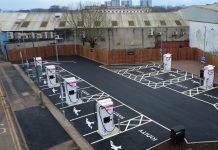Former energy minister Chris Skidmore today issued a call for volunteer co-operatives and solar energy practitioners to join forces and lobby hard for green energy during the election campaign.
Describing himself today as ‘politically homeless’, Skidmore resigned last year as a Conservative MP and party member over the Sunak government’s retreat from green initiatives, including delaying tougher requirements on home insulation and extending sales of petrol-driven cars.
Re-affirming his faith as a Conservative in markets, Skidmore told a solar conference in London :
“The future of energy is local. Community energy will create more flexibility for consumers, in bringing cheaper, cleaner electricity, achieving Net Zero, even balancing the grid. It re-builds communities. But too few politicians realise its implications”.
While sitting as a Bristol MP, Skidmore was tasked by premier Johnson to conduct an expert review of Britain’s Net Zero policies. His “Mission Zero” report in January 2023 contained over 120 recommendations, re-affirming the goal’s necessity, and calling for accelerated practical measures to reach the target, in the face of opposition from several fellow Conservatives at Westminster.
Rishi Sunak’s subsequent wavering over Net Zero convinced Skidmore to end his 14 year career at Westminster and his Tory party membership, concentrating instead on work as professor of Net Zero policy at Bath Unversity.
On 27 June with trade body Renewable UK, Skidmore will publish “Net Zero at the Crossroads”, a new assessment seeking to influence the incoming government’s pursuit of energy sustainability and deadlines towards its delivery. The day is the fifth anniversary of Skidmore while energy minister signing the Johnson government’s Net Zero goals into UK law.
The ex-minister & ex-Conservative told Solar Media’s UK Solar Summit this morning that he remains committed to continuing his cross-party advocacy for green energy, including in community fora such as Oxford County Council’s energy round table.
“My message to practitioners in solar and in community energy is to engage as fully as possible with politicians at every level at this crucial time for clean power”, Skidmore told the conference.
Activists & volunteers working through around 300 energy co-ops in England & Wales are a corrective, Skidmore implied, to what he called Britain’s culture of viewing energy as ‘a commodity imposed from above, top down’. He called for more community co-ops such as that he had known in Bristol, and endorsed the work of the ‘Right of Local Sale’ campaign, to which over half of all MPs are now signed up.
Recalling attitudes among his former Conservative colleagues at Westminster, Skidmore shared with the conference analysis that, of the 100 constituencies with the most household PV deployed, every one is represented by a Conservative MP.
Skidmore recalled that 49-day premier Liz Truss enthused to him over the benefits of rooftop solar, but opposed PV farms on agricultural land. He reminded delegates that only 3% of UK land would be required to deliver the government’s continuing goal of 70GW of installed PV by 2030.
During his work on the Net Zero review, Skidmore recalled that Craig McKinlay, leader of the Net Zero Review group of sceptical Tory MPs, had expressed frustration that over one million homes installing PV in the past decade would face added expense of having to upgrade rooftop systems in future.
Britain needs to follow the example of more participative energy cultures of our European neighbours, Skidmore argued. Technical changes enabling dispersed low carbon generation, sometimes no longer under the control of corporations, dictated that a culture change was necessary. Community participants should be guiding politicians, he said.
Interest declared: the author invests in and participates in several local UK energy co-operatives, including in London & the south east.




